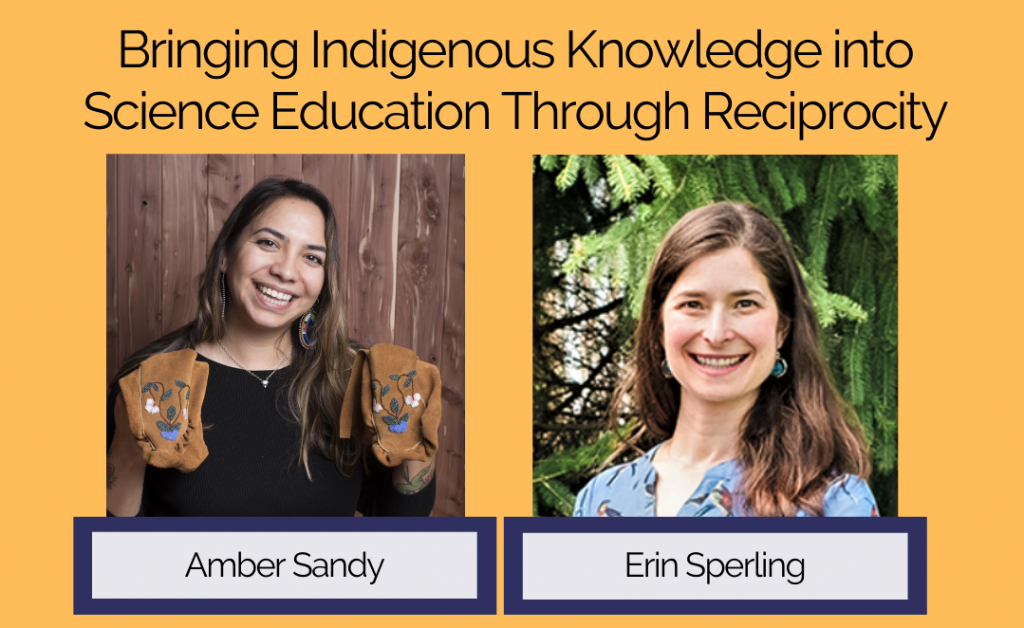Robertson Program hosts first webinar of its Indigenous Ways of Knowing in Math and Science series
In our first-ever webinar, Educator Bryan Bellefeuille shared how he brings Traditional Indigenous Mathematics in to his Ontario Classroom. With more than 450 educators watching live on YouTube, Bryan told viewers about the journey that led him to help educators on their path to exploring and including Traditional Knowledge in their classroom.
Bryan spoke of the difficulties that arise when trying to articulate Traditional Mathematics in a Western context. Difficulties heighten further when attempting to connect these activities to expectations laid out in the Ontario curriculum. For Traditional Indigenous Knowledge to be taught in Mathematics, it takes time and commitment to understand how traditional activities can contain vast mathematical and scientific information.
“You cannot learn Traditional Indigenous Mathematics from a book,” Bryan said to educators beginning to learn about Indigenous culture and math. “You need to do it.”
Bryan showed participants that there are many examples of math embedded in Traditional Indigenous activities. For example, when constructing a Teepee, trees of similar height and width must be identified because they must all conform to one size. When cutting the tree, one must determine the correct angle at which it should be cut, and the direction it must fall. The journey back to the construction site must be mentally mapped. When building the Teepee, it is important to determine how high the walls must be raised off of the ground to attain adequate air ventilation.
“I always encourage people to start with something they’re interested in,” he said, acknowledging that canoe construction, basket weaving, gardening, cooking and the making of tools all require mathematical thinking.
Bryan shared a Math Plan for educators interested in exploring Traditional Indigenous Mathematics in their classroom:
- What are some areas of Indigenous culture are you interested in?
- What are some mathematical concepts in this topic?
- Who are some resources and Traditional Knowledge holders you can reach out to?
- What are some resources you can access?
Identifying and connecting with Traditional Knowledge holders is of the utmost importance.
“In my community, we have a few crafting elders – but no one calls them a crafting elder,” Bryan said. “Those are the people that hold the knowledge about crafting – so that’s where you need to go. They may not be able to articulate the math, but that’s where your knowledge has to come from.”
Bryan Bellefeuille
Anishinaabe of Nipissing First Nation
Bryan Bellefeuille is a firekeeper, a grass dancer, a traditional fisherman, and a father of three. Bryan graduated from the Schulich School of Education at Nipissing University after completing an undergraduate degree in Mathematics. During this time, he was invited to speak at the Perimeter Institute for Theoretical Physics regarding Indigenous Mathematics, as well as attend a session of the same topic at the Fields Institute of Mathematical Sciences. Bryan previously worked with Indigenous people within the Ontario and Canadian Criminal Justice System as a Gladue Report Writer. At this time, he helped edit the Ontario curriculum for Grade 10 History in response to the Truth and Reconciliation Commission’s Call to Actions. Currently, Bryan teaches at Blind River Public School on the North Shore of Lake Huron as an Ojibwe language teacher and an Indigenous Culture and Curriculum Support worker.
Indigenous Ways of Knowing in Math and Science Webinar Series
In February 2021, The Robertson Program launched the Indigenous Ways of Knowing in Math and Science webinar series to showcase how Indigenous and non-Indigenous educators incorporate Indigenous ways of knowing in their math and science classrooms. The series is presented in partnership with Kikinoo’amaadawin.
Kikinoo’amaadawin
The Kikinoo’amaadawin Webinar Series is a collaboration between Dr. Jean-Paul Restoule and Dr. Angela Nardozi that has provided a platform for Indigenous and Settler educators and knowledge keepers to share their knowledge in a variety of topics since 2019. Dr. Jean-Paul Restoule (Dokis First Nation) is an Anishinaabe scholar and educator who is currently the Chair of Indigenous Education at the University of Victoria. He is concerned with bringing Indigenous worldviews to a wide audience and infusing Indigenous perspectives into mainstream practice. Dr. Angela Nardozi is a Settler and guest on Turtle Island who is Italian-Canadian. She is a member of the Ontario College of Teachers and received her Ph.D. in Education from OISE/UT. She has spent over a decade working alongside Indigenous communities and with non-Indigenous educators, including as the Project Manager of the Deepening Knowledge Project from 2011 to 2016.

